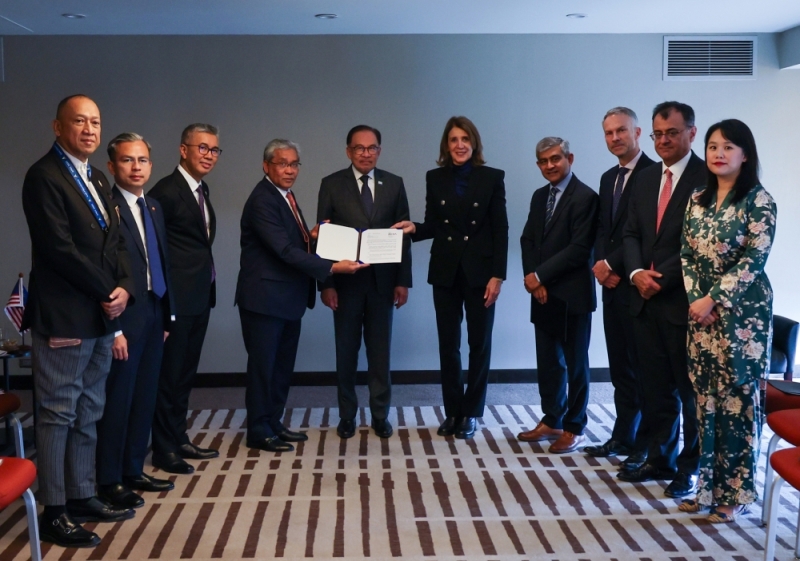Malaysia has secured a total of RM63.02 billion in proposed investments in the United States (US) mainly from technology giants, Prime Minister Datuk Seri Anwar Ibrahim said today.
Out of the total, RM8.33 billion investments were from the trade and investment mission to the US organised before the start of the Asia-Pacific Economic Cooperation (Apec), while the remaining investments were from the various one-on-one meetings held by Anwar here.
The investments from the trade mission are from Abbott Laboratories, Mondelez International, Amsted Rail, Hematogenix, PerkinElmer, Ford Motor Company, Boeing, Amazon Web Services, Enovix, and Lam Research.
“The remaining (investments) have been secured from one-on-one meetings with technology giants such as Google, Enovix Cooperation, Microsoft, TikTok and TPG,” he told the media at the end of his official visit to the US, here.
TikTok’s investment is quite big, he said, adding that it all boils down to how fast Malaysia approves these investments.
“And taking into consideration any necessary approval and incentives. I emphasise the issue of technology transfer, training so that our capabilities in the fields we explore are more advanced and challenging,” he said.
Malaysia is also actively courting electric vehicle players, including Tesla.
“Well, he seems to be positive about Tesla’s presence in Malaysia,” Anwar said when asked on his video call with Tesla’s chief executive officer Elon Musk.
Anwar, who is also the Finance Minister, said Tesla’s presence in Malaysia is a very good indicator for the country.
“The Super Charging station will be further increased in Malaysia,” he said.
Malaysia’s stance on the importance of efforts to attract investment was also voiced by the prime minister at the Apec 2023 Chief Executive Officer (CEO) Summit, particularly concerning the aspect of clear and consistent investment policies.
“The implementation of these policies and strategies plays a role in attracting investment into the country.
“The need to establish a one-stop centre for crucial investments is essential but this one-stop agency should also be more proactive in facilitating and expediting the implementation processes and procedures related to investments.”
On the issue of the US-China conflict, Malaysia would always adhere to a neutral stance as both countries are important trading partners for Malaysia.
“I emphasise that Malaysia and Asean countries in general should not be dragged into or involved in the cold war between major world powers,” he said.
Accompanying him on the official visit were his wife Datuk Seri Dr Wan Azizah Wan Ismail, Foreign Affairs Datuk Seri Dr Zambry Abd Kadir Minister, Communications and Digital Minister Fahmi Fadzil and other members of the delegation that were received by Investment, Trade and Industry Minister Tengku Datuk Seri Zafrul Abdul Aziz, Malaysia’s Ambassador to the United States Datuk Seri Mohamed Nazri Abdul Aziz and Consul General of Malaysia in Los Angeles Anil Fahriza.
“I am happy we had the opportunity to express and be able to articulate our position, engage privately and discuss intimately and not in the combative mode but at least to secure understanding and collaboration,” he said.
The prime minister also participated in the Indo-Pacific Economic Framework for Prosperity (IPEF) Leaders’ meeting hosted by United States President Joe Biden on Nov 16, 2023.
The meeting was held to recognise the success of IPEF ministers in signing the Pillar 2 Agreement (Supply Chain) on Nov 14, 2023.
“Additionally, the leaders of IPEF member countries were also informed that substantive conclusions have been reached for Pillar 3 – Sustainable Economy and Core 4 – Fair Economy negotiations while Core 1 – Trade negotiations have made good progress.
“Overall, Malaysia welcomes these developments and will continue to collaborate with all IPEF countries to conclude Pillar 1 negotiations for the collective benefit of the IPEF region,” he added.
Source: Bernama
Malaysia bags RM63.02bln in US investments — PM
Content Type:
Duration:




